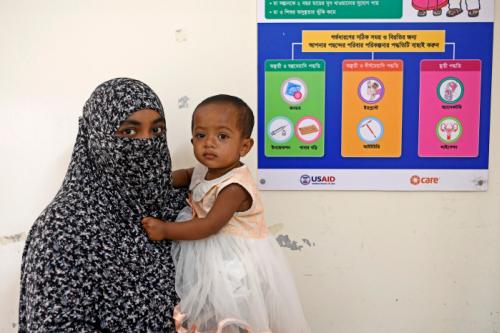Editor’s Note: After five years as USAID Administrator, Rajiv Shah is stepping down this month. On February 3, at Brookings, Shah shared reflections on his time heading the world’s largest bilateral aid agency.
“Security is a byproduct of strong institutions, a sustainable climate, and helping people seek justice through the rule of law,” said USAID Administrator Raj Shah last week at Brookings. And as Shah approaches the end of his more than five-year tenure at the agency, he sounded more bullish on development than ever.
In our one-on-one conversation about all manner of things USAID, I pressed Shah to comment on the challenges he has faced: the so-called death of official development assistance (ODA), tenuous progress in Haiti, the tension between local ownership and control over resources and ensuring effectiveness in impact of resources, and the ability of a large bureaucracy like USAID to truly become innovative. Shah had an answer for everything, and seemed upbeat about the future of the U.S. development agency and almost already-wistful about stepping away from the institution and the mission he so passionately believes in.
The administrator strongly defended the progress in Haiti. While still the poorest state in the Western Hemisphere, the country has made strong progress in poverty reduction, nutrition, agricultural yields, foreign investment and economic growth compared to before the earthquake. Moreover, he reminded us of the scale of devastation and destruction of the institutions needed to manage development. The earthquake had leveled the majority of government buildings and also destroyed the United Nations office there, as well as tragically killing many of those most familiar with the country’s development needs and challenges.
On USAID’s organization, Shah listed with pride the ways the agency has reformed over the past half-decade. The amount of USAID resources put toward public private partnerships has gone from 8 percent when Shah took the agency’s helm to 46 percent as he prepares to leave. He mentioned the agency’s flexibility and emphasis on “renewal,” twice highlighting that they cut 38 percent in programs—during the sequestration no less—in order to flexibly focus on strategic choices that had proven the best returns on investment. While “not an easy task” to move money around to the best programs, it can be done if one is willing to fight aggressively, Shah said. Similarly, the whole-of-government approach can be a boon to U.S. development so long as there is a strong development institution at the table.
Shah also unabashedly declared local ownership and development of local human capital the way forward. While it takes away some control from donors, the additional risk is worth taking said Shah, given the sustainable impact that such organizations make. But progress will come in a timeframe closer to ten years in such instances—not immediately.
Perhaps most interesting was Shah’s excitement about this year’s formation of a set of Sustainable Development Goals (SDGs) to replace the outgoing Millennium Development Goals. While I know USAID would prefer a more limited set of goals than some others, Shah nevertheless claimed it was time to “seize the opportunity” to make these goals effective in ending extreme poverty, even if it required USAID doing some reorganization around the new goals.
In perhaps the most intimate moment of the conversation, Rajiv Shah talked about the two-way impact of a career in development. The ability to serve a great moral cause and contribute to relieving the suffering of those less fortunate is one direction of impact, but there is also a reverse impact: those working in development come away profoundly affected by their experiences and become more humble and better human beings.
The Brookings Institution is committed to quality, independence, and impact.
We are supported by a diverse array of funders. In line with our values and policies, each Brookings publication represents the sole views of its author(s).




Commentary
A Conversation with Rajiv Shah, Administrator of USAID
February 6, 2015